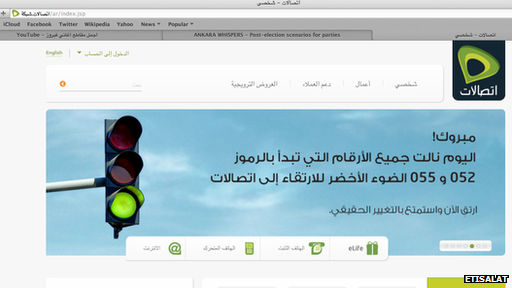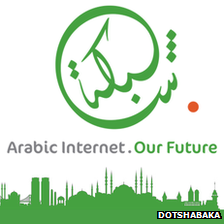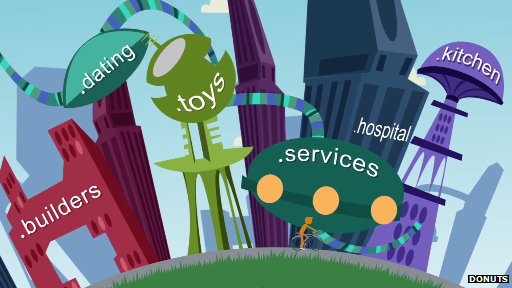DotShabaka top-level internet domain goes live
- Published

Telecoms provider Etisalat was one of the first sites to use the new شبكة. suffix
An Arabic net address ending has become the first to go live as part of the rollout of more than 1,000 new generic top-level domain (gTLD) name suffixes.
The first websites ending in شبكة. - pronounced dot shabaka, and meaning web - went online a day ahead of schedule.
Until now, there were only 22 gTLDs, including .com and .org, in addition to country code endings, such as .uk.
Organisers say the existing system had become too crowded, but critics say the expansion will add to firms' costs.
Businesses wishing to protect and publicise their brands will want to register what are called second-level domains under the new suffixes- for example Coca-Cola might want to safeguard coke.shop when the .shop gTLD becomes available.
Although most of these new domains should only cost about £10 to £30 a year to own, the sheer number and associated administrative costs will add up.
Wholesalers offering the new gTLDs need to charge such amounts to cover their own costs, including the $185,000 (£113,200) application fee they had to pay to the Internet Corporation for Assigned Names and Numbers (Icann), a non-profit organisation overseeing the process.
'Monumental' move
The DotShabaka Registry - the Dubai-based business running the شبكة. gTLD - announced that both its own homepage and that of the United Arab Emirates telecoms provider Etisalat had started using its new suffix, at a conference in Dubai.

The DotShabaka Registry suggests its gTLD will help Arabic speakers
Any other organisation or member of the public will be able to start applying for their own addresses - which can rely solely on Arabic script - through registries including GoDaddy, 101Domain, and Lexsynergy from Tuesday.
"It's monumental, in my opinion, because it means the internet finally speaks in Arabic," Yasmin Omer, general manager of the DotShabaka Registry told the BBC.
"For a long time we've had Arabic-language content online but you needed to speak English to directly navigate to the sites.
"Now, if I'm an internet user that speaks only Arabic, I don't need to rely on search engines or other pools to get to where I want."
Although this is the first generic top-level domain in Arabic, there were already country code top-level domains in the script, including .الاردن for Jordan and .السعودية for Saudi Arabia, which went live in 2010.
Other non-Latin script gTLDs expected to launch over the coming days include 游戏, Mandarin for game; сайт, Russian for site; and онлайн, Russian for online.
Meanwhile, a wholesaler called Donuts, external has announced that seven new English-language suffixes will become available from Wednesday. They are:
.camera
.equipment
.estate
.gallery
.graphics
.lighting
.photography
Artificial constraints
The domain name system was created to offer an easy-to-use alternative to the long strings of letters and numbers that represent the internet protocol (IP) addresses used by computers under the IPv4 and IPv6 systems.
There was no technical reason for there to be any limit to the number of gTLDs used, however the list was originally limited to .com, .us, .edu, .gov, .mil, .net and .org.

Top-level domain name wholesaler Donuts plans to release hundreds of suffixes
Over time, Icann has expanded the range to include others including .info, .mobi and .asia.
But it says that offering further choice, external will allow more competition and innovation into the marketplace.
"The constraints that we had in the past with top-level domains were purely artificial, which is one reason that the very popular ones - for example .com - can be so expensive," explained Dr Ian Brown from the Oxford Internet Institute.
"But how far people actually use them to access sites is an important question. In reality these days most people tend to go to a search engine rather than try to remember a company's domain name that they have seen on an advert, for example.
"So, I think the impact overall will be less than it might have been, say, five years ago. I think it's also a valid complaint from companies that say they are already having to shell out quite a lot of money to register their trademarks and brands under the existing top-level domains, and worry they will have to do this for hundreds or even thousands of new ones."
- Published27 January 2014
- Published23 October 2013
- Published26 March 2013
- Published21 November 2012
- Published20 November 2012
- Published14 August 2012
- Published20 June 2011